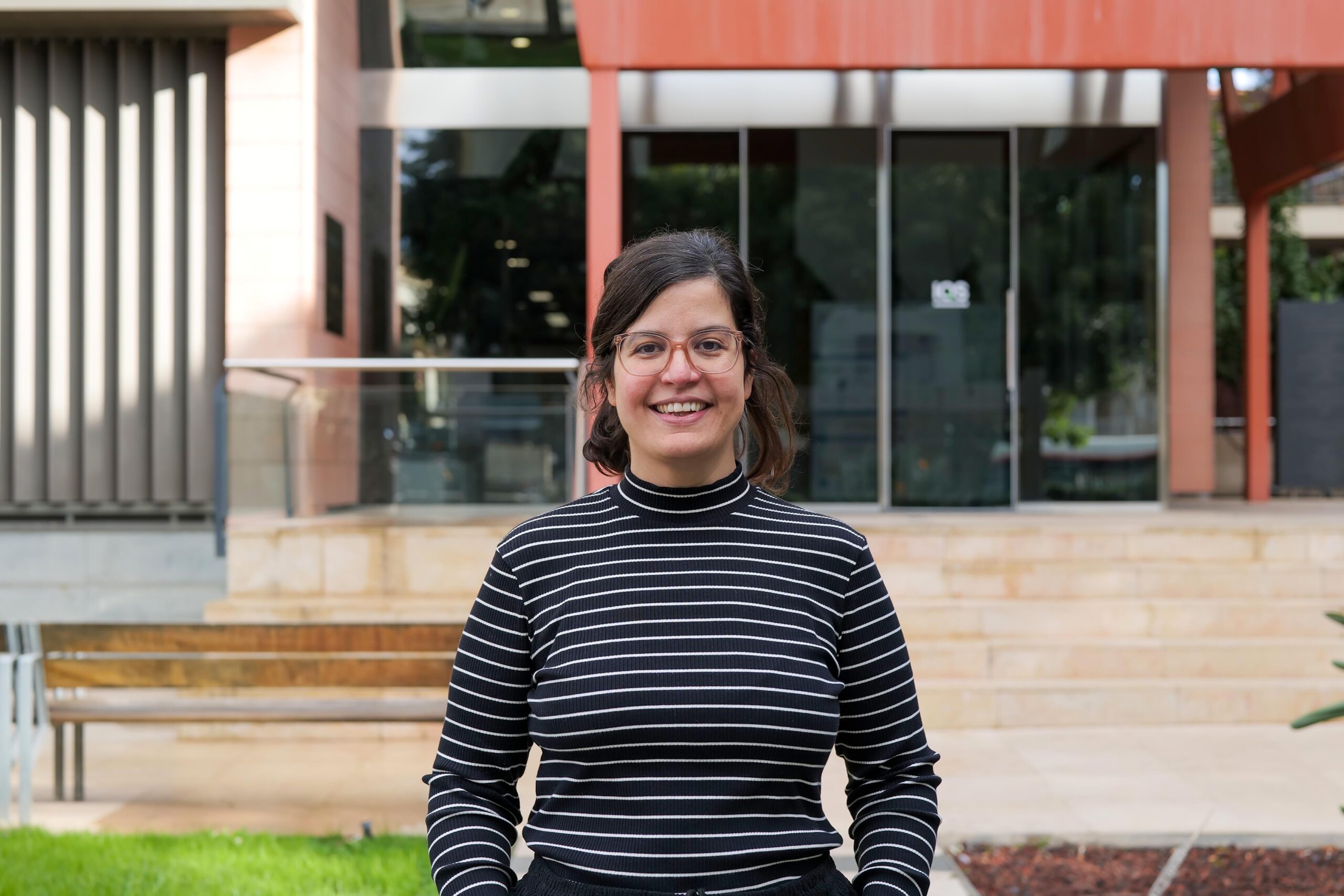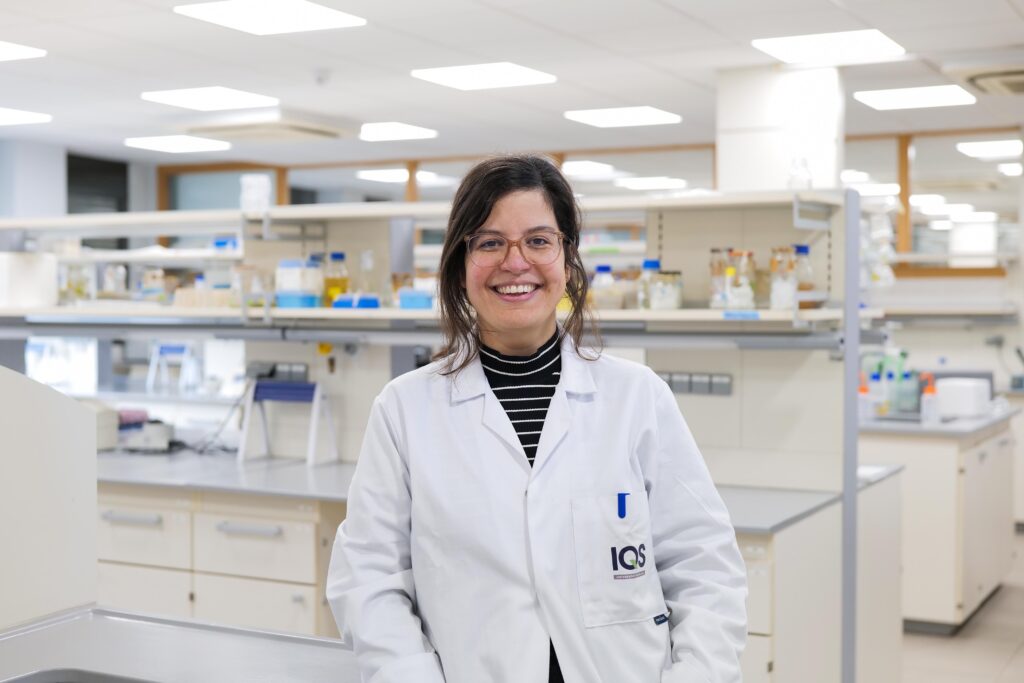Dr Norma Fàbregas Vallvé has recently joined the IQS Bioengineering Department after having earned one of the prestigious Ramón y Cajal grants, which will allow her to conduct research in her fields of expertise for five years. Her research includes plant signalling and metabolism mechanisms in response to water deficit stress, multi-omics approaches for the diagnosis of environmental stress in plants and other organisms, and genomic studies to characterize environmental microbiomes.
"Being able to do teaching, research, and transfer activities gives us a lot of power as researchers"

The Ramón y Cajal grants awarded by the Spanish Ministry of Science, Innovation, and Universities – State Research Agency aim to promote the incorporation of research personnel with outstanding career paths into research organizations to gain skills and capabilities that enable them to establish themselves within the Spanish Science, Technology, and Innovation system, especially for individuals who have done research activities abroad.
We recently talked to Dr Fàbregas about this significant grant she has earned, joining IQS, and her lines of research.
What has your career as a researcher been like until joining IQS now?
Well, I’ve done a lot of things! I studied Biochemistry at the University of Barcelona and completed my master’s degree in Developmental Biology and Genetics. In parallel, I did my internship and my master’s degree in the group led by Dr Ana Caño Delgado with the CSIC, a group of specialists in plant steroid hormones, very similar to our oestrogen. I liked it so much that I stayed to do my PhD with this group, in the area of plants, this time at the Centre for Agrigenomics Research (CRAG), where the group had moved to, and in collaboration with Wageningen University in the Netherlands, where I did a couple of research stays. Actually, part of my scientific career has been successful thanks to Dr Caño Delgado, a renowned geneticist with whom I have worked for more than 10 years and with whom I have always had great synergy. She was my mentor, and I was able to start different lines in her research group.
After my thesis, I stayed in Dr Caño’s group for a couple more years working on a project with the same steroid hormones, but now in collaboration with a company to develop a technology transfer project. The subject attracted me a lot. It gave me a different experience – the direct application of basic research and the contribution of commercial value – and my interest in plants and solutions to drought stress came from this. All this work formed the proof of concept for an investigation that later enabled Dr Caño Delgado to get an ERC Consolidator project. It’s a really interesting field and all of this transfer activity has resulted in a couple of patents and the creation of the first company to emerge from CRAG, Planet Biotech, which develops products to protect crops from environmental stress caused by climate change.
“My interest in plants and solutions to drought stress came from Dr Caño’s group”
After this period, I gained a postdoctoral position at the Max Planck Institute of Molecular Plant Physiology (MPIMP) to work with Dr Alisdiar Fernie, one of the most prestigious researchers in the area of metabolomics applied to plants. I spent three years (2017-2020) working on my own metabolomics project applied to stress in plants due to lack of water.
“At Max Planck I worked in the area of metabolomics applied to stress in plants”
But I wanted to come back home and applied for several grants. In 2020, coinciding with the pandemic, I was awarded a Torres Quevedo grant to work with microbiome and bacteria genomic sequencing tools in the area of veterinary medicine. These grants involved working with a company, in this case Vetgenomics S.L., moving away from basic academic research and developing new technologies and lines of research within the company itself. Here I developed RNA-Seq techniques and learned to characterize genomes and different environmental microbiomes. It was a really different experience that was outside of my comfort zone, but very enriching and highly productive. I worked there for three years, while still applying for a Ramón y Cajal grant.
You finally earned it in 2024. What has this grant meant for you?
Well, the opportunity not to give up my research. The Torres Quevedo grant aims to incorporate doctors into private companies, opening up the possibility of becoming researchers in the same company. But this situation didn’t coincide with my goals. The Ramón y Cajal grant, on the other hand, allows me to get back to my own research, which I like most of all and which I was gradually moving away from. I finally earned it! Then it was time to decide where to carry it out for five years.
And why did you choose IQS – URL?
I did various interviews at universities and research centres. What made me choose IQS was the energy I felt from the people who interviewed me compared to other options. And coming to Ramon Llull University, a private university, was a challenge for me! But I came out of the interviews really satisfied and felt that I connected with the school.
In short, what solidified the decision for to come to IQS was the interview process itself, which was highly organic, and the feeling that derived from it, as well as the possibility of doing research, teaching, and technology transfer at the same time. It was also very tempting to have direct access to highly powerful facilities that are key to developing my research areas, such as the mass spectrometry equipment at the IQS-Sciex Demo Lab.
“I decided to come to IQS because of the interview process itself and because I could do research, teaching, and transfer”
One of the things that I liked the most was the fact that I could teach classes and do research at the same time. I had only done it before with an associate professor position in Genetics at the University of Barcelona, coinciding with the Torres Quevedo grant. I really liked that experience, especially because of the relationship with the students. By teaching, you help others move forward! It’s a very human and relational facet, which I love.
“By teaching, you help others move forward, it’s a very human and relational facet”

This is one of the characteristics in the IQS identity, the three areas covered by its researchers.
Yes, and I love that! Being able to do teaching, research, and technology transfer activities gives us a lot of power as researchers.
Technology transfer is very important and crucial to bringing our research to society. In other universities it does not exist as clearly as at IQS, where researchers may be overwhelmed with work, but they show a huge passion and enthusiasm for their work. At other research centres and universities that I considered, transfer had much less weight than at IQS.
“Technology transfer is very important and crucial to bringing our research to society”
What do you hope to achieve in the end?
Balance. In my professional life I’ve done basic research and transfer work, alternating one with the other and moving from universities to research centres and companies. I’ve done a lot of different things and I don’t want to give them up!
When I earned the Ramón y Cajal grant, I thought I didn’t want to go back. Here at IQS I hope to be able to combine the three areas simultaneously: research, teaching, and transfer and for it to allow me to advance in my projects. I need to balance them: teaching and getting good assessments from students, being able to get funding to carry out my research, and being able to transfer it when the time is right, without any of the three being more important than the others.
What are your current projects?
Well, I would like to hold on to all the experience I have and open various lines of research at IQS. First, I will apply for a grant from the State Plan for Scientific, Technical, and Innovation Research, then another one for collaboration with a company, with the participation of other researchers at IQS along with external collaborators.
“I would like to hold on to all the experience I have and open various lines of research at IQS”
As I have already mentioned, I want to keep my three areas of expertise open: basic research on plants and environmental stress due to drought; continuing with studies on environmental microbiomes, which is a very cross-cutting issue and can offer a lot in lines of research that are already consolidated at IQS; and, finally, in the areas of plants and drought, seeking collaborations with companies to transfer knowledge, which is exactly what I did once I finished my doctorate.










